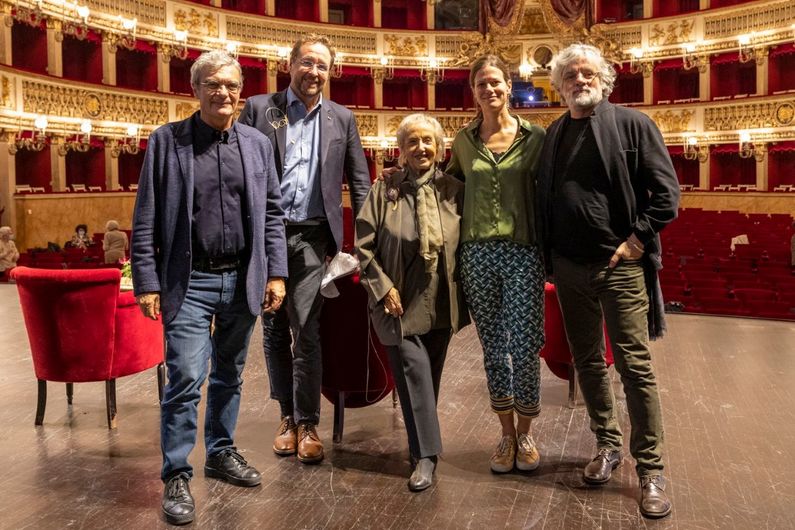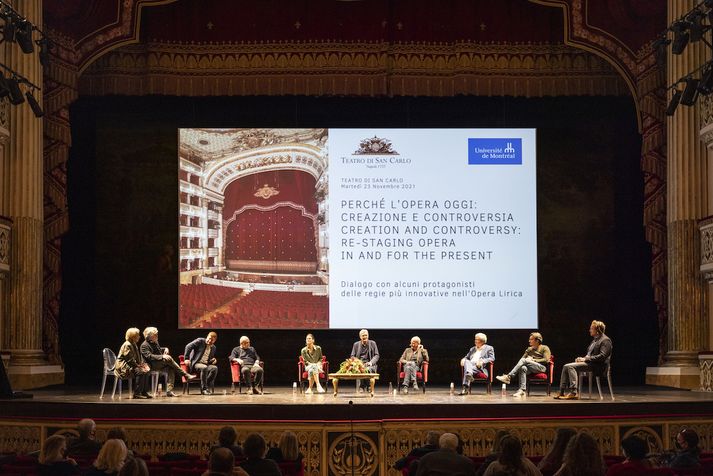Staging opera for a contemporary audience
- UdeMNouvelles
02/09/2022
- Virginie Soffer
An ethnologist and a political scientist at UdeM organize a workshop with a distinguished international group of opera directors.
On Nov. 23, 2021, the famed Teatro di San Carlo in Naples hosted a public workshop on the contemporary staging of opera. Organized by Mariella Pandolfi, professor emeritus in Université de Montréal’s Department of Anthropology, and Laurence McFalls, full professor in the Political Science Department, the workshop was an initiative of their “Politics and Music” research group and was held under the auspices of the Canadian Centre for German and European Studies.
It was the first-ever collaboration between UdeM and the Teatro di San Carlo. The event brought together six eminent opera directors from different countries to discuss the theme “Creation and Controversy: Re‑staging Opera in and for the Present.” The workshop was led by Pandolfi, McFalls and Stéphane Lissner, the Teatro di San Carlo’s superintendent and artistic director, and author of Pourquoi l’opéra aujourd’hui?
Linkages between violence, politics and music
Pandolfi and McFalls worked together for years on issues related to contemporary violence. They then began exploring the connections between violence, politics and music, creating a lecture series to explore these ideas that ran for almost seven years. Conceiving music and politics alike as sites of encounter and tension, they invited singers, conductors, musicologists and music lovers to share their insights.
“We are not musicologists and we certainly don’t want to encroach on anyone else’s territory,” said Falls. “We wanted to highlight the link between musical creation and other forms of social action. By adopting an interdisciplinary perspective, we hoped to show that music can convey multiple meanings.”
“Music is also an anthropological phenomenon,” added Pandolfi, “for music is co-constitutive of our way of being in our bodies and understanding the world.”
The pair went on to publish the fruits of these explorations in a book, Création, dissonance, violence : la musique et le politique.
An international perspective
Following its publication, Pandolfi and McFalls brought together six distinguished opera directors from Spain, Canada, Italy and Germany to share their insights: Calixto Bieito, François Girard, Claus Guth, Christiane Lutz, Mario Martone and Damiano Michieletto. None had met previously.
Pandolfi and McFalls originally planned to hold the event in 2020 and divide it between Montreal and Naples. It was then postponed and trimmed to a single day due to public-health restrictions during the pandemic. Finally, in fall 2021, the opera directors were able to sit down together at Teatro di San Carlo in Naples for a conversation that lasted over five hours.
“It was marvelous to see a project hatched by an anthropologist and a political scientist take flight and travel thousands of kilometres,” said Pandolfi. “It was UdeM in conversation with the world – and in a theatre that has been a focal point of European musical life since 1737.”
A universal art
Although an opera is always anchored in a particular time and place, it is certainly possible to stage it for audiences in another erahis was one of the key takeaways from the workshop. So while Verdi’s Othello is set in 15th century Cyprus and Venice, Martone chose to project it into a temporal “no man’s land” that could just as well be modern-day Libya, Iraq or even Afghanistan. He wanted to depict Othello as, first and foremost, a person traumatized by his experience on the battlefield. “The historical space in which an opera was imagined is erased in order to bring out its universal themes,” said McFalls.
Preserved on film
The conversations between the opera directors were recorded and will be edited to produce a film, which will be available on the Teatro di San Carlo’s digital platform. ”This means everyone will be able to experience this wonderful synergy between the artistic and academic worlds,” said Pandolfi.












